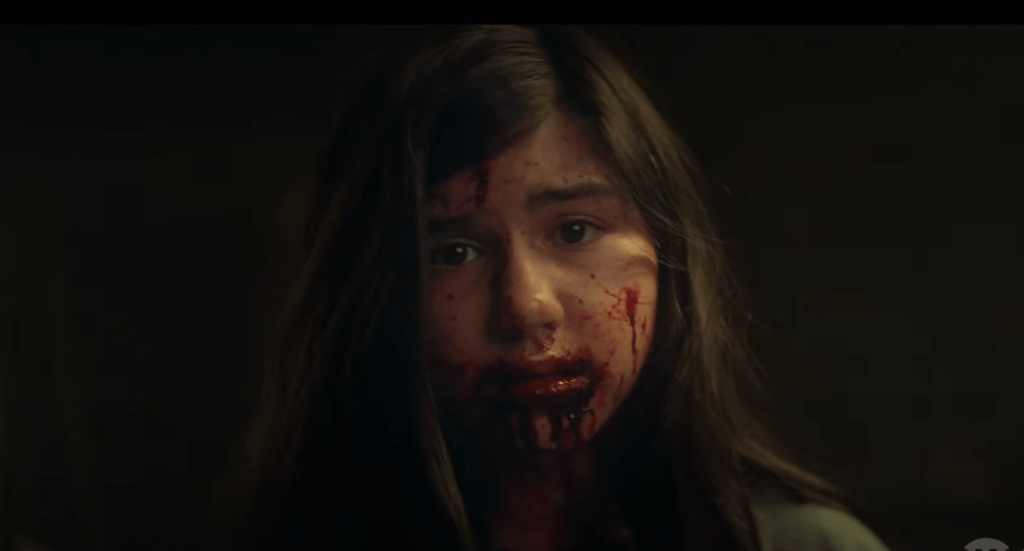Published in 2004, Swedish author John Ajvide Lindqvist’s novel Let the Right One In not only offered readers a complex and unconventional vampire story, but its inventive path also highlighted just how desperate audiences were for a new approach to the stagnated genre. Only two years after publication, the process of developing a live-action film based on the story began, with that 2008 film winning over horror fans, as well as offering such a gripping story that its accomplishments appealed to those who often overlooked the horror world. To the dismay of some, the Swedish film was then rebooted for American audiences as Let Me In, from The Batman director Matt Reeves. Much like the vampiric creatures themselves, the core concept continues to be resurrected, this time as a Showtime series, and while fans are surely somewhat exhausted by a studio continuously attempting to breathe life into a well-known narrative, this new take on the material manages to honor the core structure of the novel while expanding on the world and also avoiding the feeling of being redundant. Showtime’s Let the Right One In manages to feel just as fresh for the genre as the source material, delivering a truly touching and heartbreaking exploration of loneliness, human connection, and sacrifice.
Videos by ComicBook.com
Hoping to start a new life, Mark (Demián Bichir) moves into an apartment in New York City with vampiric daughter Eleanor (Madison Taylor Baez), as the city’s high rate of murder means he can find sacrifices for her daughter more innocuously. The only snag is that, with Eleanor’s life of solitude, she’s desperate for human connection, as she quickly befriends her neighbor Isaiah (Ian Foreman), making Mark nervous, given that Isaiah’s mother Naomi (Anika Noni Rose) is a homicide detective.
In some ways, the frequency of Lindqvist’s novel being adapted helps remove expectations from this new long-form series, as it strips away the nuance and the specifics of the source material. For many, the concept boils down to a male guardian caring for a young female vampire who befriends her neighbor. This holds true for this new adaptation, though excises from the original novel the idea that Eleanor is actually a boy who was castrated and turned into a vampire 200 years ago. At this point, the concept feels more like a game of telephone, with each adaptation distancing itself further from the actual source material. Like previous incarnations, this TV series sacrifices those nuances (surely to the disappointment of those who connected with the queer themes of previous adaptations) while also not feeling beholden to them.
By solidifying the preconceived notion of the story, making Mark a father caring for his literal daughter, we get much more emotional investment in their narrative trajectory. In the decade since Eleanor became a vampire, Mark has sacrificed everything in order to keep Eleanor’s secret safe, while also trying to identify a “cure” for her ailments, whether they be based in science or in the supernatural. Bichir’s performance especially inspires sympathy in the audience, as, unlike in other adaptations, he’s not someone who is voluntarily connected to the character, but instead has been devoted to both the human and otherworldly version of the girl. When he sees Eleanor, he doesn’t see her deadly proclivities, he only sees her as a suffering daughter.
Most versions of this story keep the father character to the outskirts, making them more one-dimensional, though this series instead shows the trauma and pain Mark goes through as he finds victims whose blood he can drain to keep Eleanor’s bloodlust at bay. However, the series also shows us how he still has to explore more human pursuits, whether that be the challenge of getting a job to pay rent or having the opportunity to establish connections with other adults. This makes for one of the more effective expansions on the original story, as rather than forcing himself into a world of isolation in service of his daughter, both of which have resigned themselves to a depressing life of solitude, Mark has to grapple with whether he’s living his life solely for his daughter or for himself. These themes will especially resonate with viewers who have spent the past few years living their lives in limited social capacities and are coping with the emotional impact of isolation; is there more comfort in reliable loneliness or in the company of others? It’s a question many of us are still figuring out, with Mark’s journey bringing with it an additional layer of effectiveness.
Another powerful narrative thread of the series is Isaiah’s loneliness, with Foreman being the show’s breakout star. Every single viewer will be able to connect with Isaiah’s journey, as his biggest source of joy is his magic hobby, which only amplifies the bullying he becomes the victim of by his classmates. Foreman brings a true delight and joy to the role, with his enthusiasm for a “dorky” hobby only making the harassment he suffers all the more painful for audiences. Not only does he suffer bullying from his classmates, but Isaiah is also processing the abandonment from his father Frank (Ato Essandoh), who has been attempting to address his issues with substance abuse. As audiences learn the tragic reasons for Frank’s absence in Isaiah’s life, it only makes Isaiah’s attempts to reconnect with his father all the more emotionally brutal to watch, with things as subtle as text messages not getting a reply (with the audience knowing why he’s not replying) being as painful to witness as any of the series’ more overt violence. Foreman is sure to become a major standout performer, and we can’t wait to see where this storyline will take Isaiah.
The long-form nature of this adaptation allows for the core concept to be expanded in other interesting ways. We get to see Mark’s journey and attempts to establish roots for Eleanor, the budding friendship between Eleanor and Isaiah, and Isaiah’s ostracization from his peers and his own father. Another interesting wrinkle is Naomi’s investigations into a series of bizarre deaths unfolding around the city, which involve highly brutal killings that are seemingly the result of a new drug. An all-new element of this adaptation involves biologist Clare (Grace Gummer) learning about what her estranged father has been up to for years, which involves a secret about her brother’s “death” and the loyal servitude Matthew (Nick Stahl) has been offering up to their family. Halfway through the season, there are still plenty of mysteries behind the work that she’s been thrown into and how the work and her family connect to the brutal crimes Naomi is investigating, the specifics of which will likely become clear by the end of the season.
The horrors of this adaptation aren’t entirely limited to the more emotional elements of the concept, as the violence is brutal, unexpected, and intense. In fact, it might be the emotional terror of the storyline that adds to the impact of the physical violence, as viewers will already be so on edge from the empathy we feel towards the various character dynamics that the more traditionally upsetting imagery hits even harder. Specifically, in Episode 2 of the series, there’s one sequence involving research animals that is tremendously intriguing and upsetting, resulting in one of the most disturbing encounters in any vampire story in recent memory, showcasing just how inventive the minds behind the series can be and how committed they were to forging a path forward in the redundant space. The overall vampire lore picks and chooses the expected rules that are honored (Eleanor burns in daylight and must be invited into homes, yet can see herself in mirrors), while the story is also keeping us guessing as to whether the vampirism is supernatural in nature or the result of a biological disease. Tonally, the vampiristic elements borrow from the monstrous horrors of 30 Days of Night and the grounded approach of the zombie reinventions of 28 Days Later. These vampires feel familiar, while also having enough tweaks to feel organically unique as opposed to upending these concepts just for the sake of it.
The many adaptations of the material in 20 years showcase just how much potential is contained in the pages of Lindqvist’s novel, reminding us of the timelessness of vampire stories and how desperate audiences are to see new interpretations of the iconic lore. While the connection between two young friends and how they can find comfort in one another in a world in which they feel ostracized is still there, it’s the other relationships and character dynamics that work the strongest in this adaptation. Every viewer has experienced all manner of loneliness, which is a core theme of all previous adaptations of the story and might ring the truest in this new series. The emotional horrors hit harder than any of the blood-sucking exploits, proving that there’s still uncharted territory left to explore not only in the vampire realm, but in this story specifically. While some audiences are sure to roll their eyes at yet another adaptation of the original novel, Showtime’s Let the Right One In is a series that horror fans will want to sink their teeth into.
Rating: 4 out of 5
Let the Right One In premieres on Showtime on October 9th.









